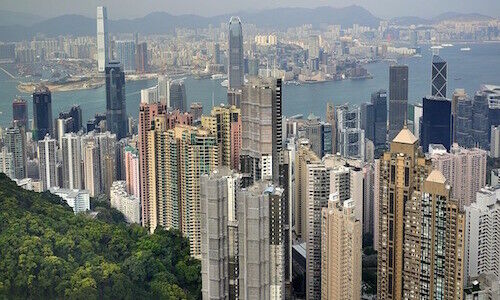HKMA Calls Commercial Property Risks «Manageable»
Media reports are highlighting rising risks from loans linked to Hong Kong’s commercial property market. The local banking regulator attempted to alleviate worries, calling the concerns «manageable».
The ongoing downturn in Hong Kong’s commercial real estate (CRE) market has led the local banking regulator to issue a commentary addressing the matter and stating that the financial system remains healthy.
«We believe that the credit risk associated with CRE loans is manageable. A significant portion of Hong Kong banks’ exposures relating to local property development and investment loans are to the large players with relatively good financial health,» said Hong Kong Monetary Authority (HKMA) chief executive Eddie Yue.
«For exposures to small and medium-sized local property developers and investors, including some with weaker financials or higher gearing, banks have already taken credit risk mitigating measures early on, and most of these loans are secured. Besides, there is no concentration risk at individual borrower level.»
Media Report on ECL
«Financial Times» published a notable media report on HSBC flagging nearly three-quarters of its Hong Kong commercial property loan book as risky, increasing almost threefold to $18.1 billion since the start of the year, following an updated model predicting defaults. In the second quarter, the British lender added $400 million for expected credit losses (ECL) related to Hong Kong CRE.
«A recent media report highlighted the risks associated with CRE loans, with a particular focus on the accounting of banks’ 'expected credit losses’,» Yue remarked, likely referring to the Financial Times report, which also named HSBC subsidiary Hang Seng as a concern due to larger exposure to smaller real estate companies.
«In fact, this is merely a calculation based on modelling for accounting purposes. Loans classified as 'expected credit losses' do not necessarily represent bad debts, and therefore cannot be used as a basis for a comprehensive assessment of banks’ asset quality.»
«Bad Bank» Rumor
Citing unnamed sources, a separate «Bloomberg» report in July said that there were talks between some of Hong Kong’s largest banks to create a «bad bank» to absorb non-performing loans in the city.
«I would also like to take this opportunity to clarify the earlier 'bad bank' rumor,» Yue added. «The establishment of a 'bad bank' is an extraordinary measure which would only be considered when banks have very serious balance sheet problems. This is entirely inconsistent with the current situation of banks in Hong Kong, which are operating in a sound manner with strong financial strength.»
Three Indicators
According to Yue, there are three basic indicators that should be used to assess the health of Hong Kong’s banks.
First is the capital adequacy ratio, with the total capital ratio at 24.2 percent at the end of March compared to the international minimum requirement of 8 percent. Second s the provision coverage rate which s standing at bout 145 percent at end-March after deducting the value of collateral. Third is financial strength with pre-tax operating profit of real banks growing 8.4 percent year-on-year in 2024.
«These three key indicators show that Hong Kong’s banking system is well-capitalized and has sufficient provisions and good financial strength to withstand market volatilities. In the face of a still-challenging macroeconomic environment, the credit risks faced by the banking sector have increased in recent years, yet the profit models of banks have not been affected,» Yue noted.
Real Market Pressure
Nonetheless, Yue admitted that the sector was facing pressures due to global trends, such as the rise of e-commerce and remote work, domestic drivers in supply and demand dynamics, like the increase in office competitions, and the high interest rate environment in recent years.
«Although the global economic outlook is subject to various uncertainties and many industries have been severely impacted, the banking sector has remained sympathetic to customers in difficulties and has been riding out challenges with them, one crisis after another,» Yue concluded. «The HKMA, together with the banking sector, will continue to do their utmost to support the development, upgrade and transformation of the real economy.»


























